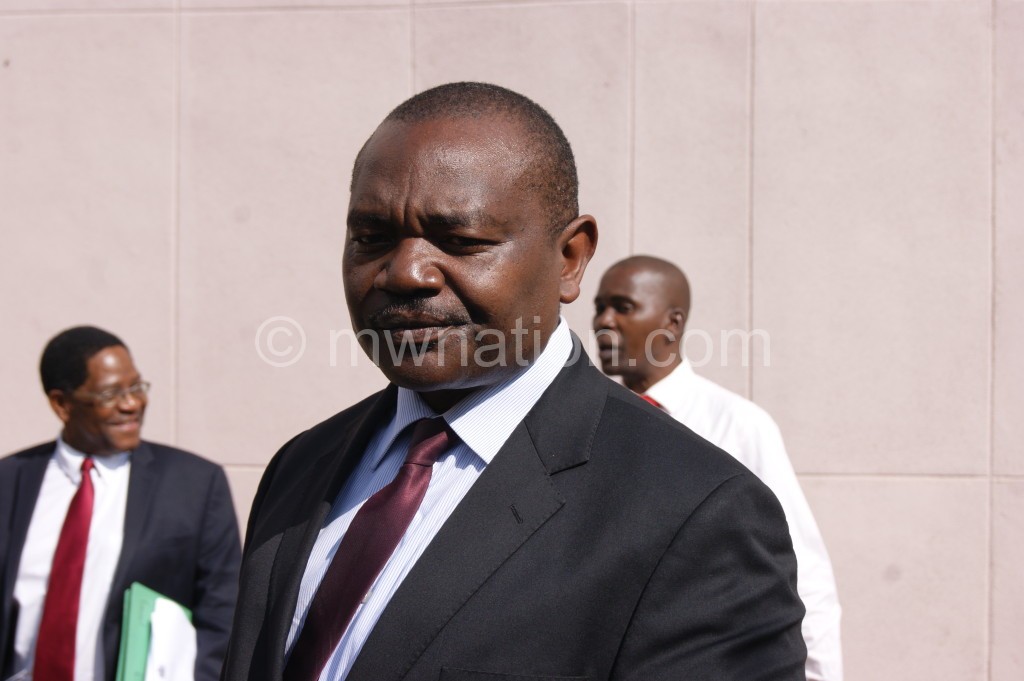Judges want polls case done in 12 days
The five-judge panel of the High Court of Malawi sitting as the Constitutional Court has set an ambitious 12-day period to conlude trial in the highly-anticipated presidential election nullification petition case.
When the court convened for the commencement of the substantive hearing in Lilongwe yesterday, the panel demonstrated its sense of urgency when, through its chairperson Healey Potani, it dismissed an application by Attorney General (AG) Kalekeni Kaphale for an adjournment to have six days to peruse documents purportedly submitted late by petitioners.

Reading the court’s decision on Kaphale’s application, judge Mike Tembo said: “The court is not convinced that an adjournment was merited at this point.”
Instead, he said the panel—which also comprises judges Ivy Kamanga, Dingiswayo Madise and Redson Kapindu—would grant the respondents two days, notably Saturday and Sunday, to study the documents. He said hearing on Monday would start in the afternoon to provide more time in the morning hours for study of documents.
The Attorney General, who is representing the Malawi Electoral Commission (MEC)—the second respondent in the matter, raised an adjournment application earlier in the day, saying the second petitioner, Malawi Congress Party (MCP) president Lazarus Chakwera, had submitted seven new files.
The application was backed by lawyers for the first respondent, President Peter Mutharika, who also cited limited time to study the new files as justification for the adjournment application.
But lawyers representing Chakwera and the first petitioner Saulos Chilima of UTM Party asked the court to reject the application.
Taking turns, private practice lawyers Marshal Chilenga (for Chilima) and Modecai Msisha, Senior Counsel, (for Chakwera), insisted that the said newly submitted materials were replies to documents previously submitted by the parties to the case.
Chilenga described the application for adjournment as “misconceived and unfortunate”.
He also challenged Kaphale’s claim that Chilima’s lawyers had not served his legal team with some of the documents. The AG subsequently withdrew the assertion.
On his part, Msisha explained that some of the replies were responses to MEC sworn statements; hence, there was no need for MEC lawyers to ask for more time to study the same. He further observed that MEC lawyers also served his team files after the period stipulated by the court.
Msisha further argued that some of the documents in the files contained documents MEC was supposed to disclose, but failed to do the same.
In an interview after the adjournment, Kaphale told journalists that the rejection of the application was a setback, but was quick to add the legal team was able to adjust to proceed with the case.
“We didn’t expect it to go this way because there is material we still have to read, but we had come prepared nonetheless to do the cross examination. We are still in preliminary stages [of cross-examination] and we will continue,” he said.
The case has attracted greater public interest, with scores thronging into the court and potentially millions following proceedings through live radio broadcasts by Zodiak Broadcasting Station, MIJ FM Radio, Malawi Broadcasting Corporation and Times Radio.
There was tight security at the court where the presiding judges made way in a convoy of Toyota Landcruiser Prado vehicles with concealed registration numbers under the escort of Malawi Defence Force (MDF) amoured vehicles.
To get into the court premises, lawyers, politicians, ordinary citizens, the media and all were subjected to searches.
Supporters from the major parties stayed away from the court premises as advised by their leaders.
Besides allowing broadcasters live coverage, the court has also taken on board interpreters for the public to follow proceedings in the widely spoken vernacular Chichewa language.
However, the introduction of interpreters brought mixed results yesterday as, in some cases, the interpreters took extended periods to translate from English submissions.
In some cases, the five interpreters who took turns, had to be rescued by both lawyers and Chilima who, alongside Kaphale, spoke most yesterday.
Writing on Twitter, Edge Kanyongolo, a professor of law at the University of Malawi’s Chancellor College, observed that the Judiciary experiment had exposed limitations of the vernacular Chichewa language.
He said: “#MalawiElectionsCase Simultaneous translations of proceedings has already exposed limitations of the Chichewa language capturing ‘legal language’.” There are 23 lawyers representing the parties in the case and two friends of the court





